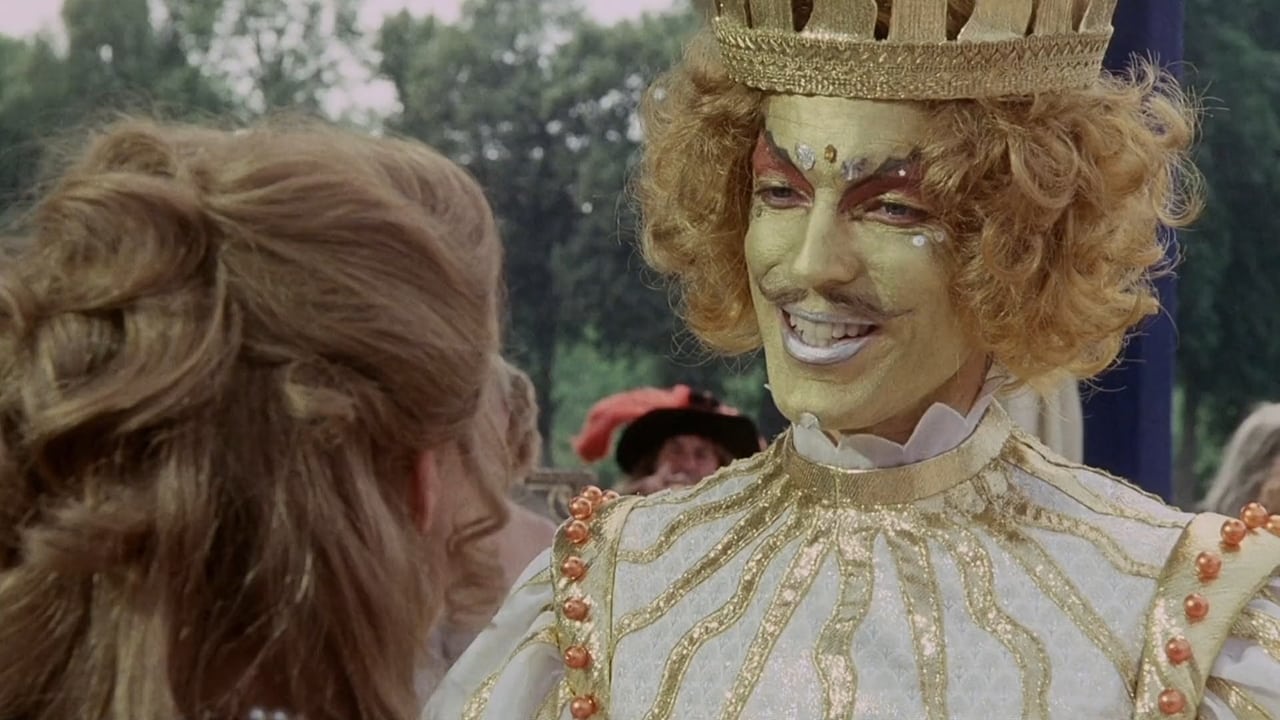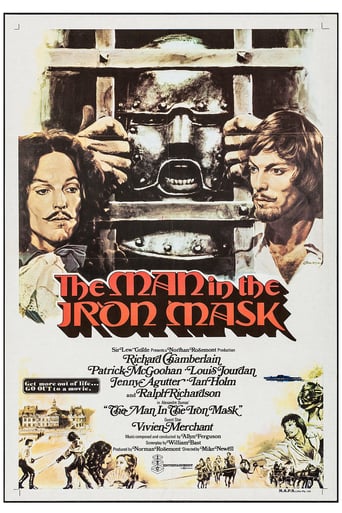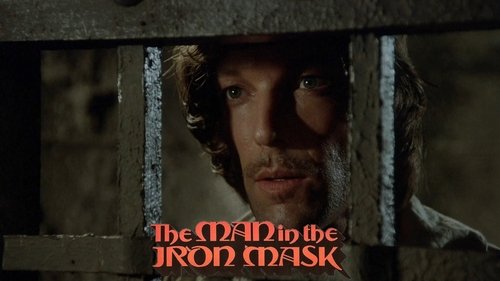


Some things I liked some I did not.
... View MoreExcellent characters with emotional depth. My wife, daughter and granddaughter all enjoyed it...and me, too! Very good movie! You won't be disappointed.
... View MoreIf you like to be scared, if you like to laugh, and if you like to learn a thing or two at the movies, this absolutely cannot be missed.
... View MoreThere are moments that feel comical, some horrific, and some downright inspiring but the tonal shifts hardly matter as the end results come to a film that's perfect for this time.
... View MoreThe Man in the Iron Mask is set in 17th Century France & starts in Burgundy where musketeer D'Artagnan (Louis Jourdan) captures a man named Philipe (Richard Chamberlain) & sends him to be imprisoned in the Bastille prison in Paris with orders no-one else sees or speaks with him. While at the prison visiting her father a young woman named Louise (Jenny Agutter) is accompanied by a high ranking minister named Fouquet (Patrick McGoohan) who recognises the man Philipe as an exact double for King Louis XIV (Richard Chamberlain), visiting Philipe later Fouquet sees a birth mark exactly the same as one on King Louis & is convinced that Philipe is in fact the identical twin brother of King Louis who was meant to have died at birth but somehow lives unaware of who he is, reporting back to King Louis a plan is hatched to send Philipe to an island fortress prison Pignerol & encase him in an iron mask so no-one ever sees his face but D'Artagnan & minister Duval (Ian Holm) plan to rescue Philipe & use him to overthrow King Louis & save France...This British & American co-production was directed by the prolific Mike Newell who has gone to direct recent Hollywood fare such as Harry Potter and the Goblet of Fire (2005) & Prince of Persia: The Sands of Time (2010) & is a fairly lavishly produced & colourful adaptation of Alexandre Dumas père novel The Man in the Iron Mask which was his final book to feature the Three Muskateers. I must admit right now that I have never read the book so cannot compare the two although I am sure they are fairly similar & share the same basic plot, The man in the Iron mask isn't usually the type of film that I watch but it was shown on afternoon telly over here so I decided to give it a go. I must admit that I was expecting a bit more action here, a few more sword fights & chases & was a bit surprised at how talky this is. That's not to say it's a bad film by any means, it held my interest & I liked the story which is told efficiently & effectively enough but I was sat there waiting for The Man in the Iron Mask to spring into life & it never did. The switch at the end as Philipe takes the place of his brother is nothing more than a con trick while Philipe being released from his iron masked imprisonment is also very straight forward apart from a brief horse chase & sword fight. The plot is solid enough, there's the expected treason, lies, political skulduggery, mistrust, the odd plot twist, love triangles & romance as the future of France is on the line & I enjoyed the story but there have been various adaptations of the novel & it's a well known story so maybe there won't be many surprises here. I did like the rather ironic & downbeat ending as King Louis gets his comeuppance in a rather unpleasant way, the only problem is I wasn't totally convinced by the reasons given by King Louis in the first place as to not just kill Philipe outright but if he had there wouldn't have been a story, would there? Also, if Philipe was living in France in Burgundy why had no-one ever recognised him before as looking exactly like King Louis? Not my type of film really but I still enjoyed it for what it was although it probably helps that I have never seen any other adaptation of the novel before, not even the Leonardo DiCaprio one from 1998.Although apparently made for telly by the British production company ITC this actually looks very nice & I am surprised it never got a theatrical release in either the UK or US. The sets, locations & costumes are all very impressive & colourful & give a real air of authenticity to the film, the iron mask itself is a fearsome looking prop with it being soldered onto Philipe's head a particularly good moment. Like I said earlier there's really not that much action in this which is surprising, I would have though there would have been more sword fights & shoot-outs & stunt work but I was obviously wrong. Just don't expect much action that's all I am saying, this is more of a plot driven adaptation than elaborate stunt work.I would have thought The Man in the Iron Mask had a reasonable budget as it's actually filmed in France including Fouquet's actual Cháteau Vaux-le-Vicomte, the Palace of Fontainebleau and the Cháteau de La Houssaye & it show's with some great location work. There's a top cast here including Richard Chamberlain in dual roles, Jenny Agutter, Ian Holm, Patrick McGoohan, Ralph Richardson & Louis Jourdan who is the only French actor here despite the entire film taking place in France with French character's.The Man in the Iron Mask has been adapted to the silver screen no less than a dozen times & this is the only one I have seen thus far so cannot really compare it to any other version but I liked it for what it was, a solid historic political thriller with a hint of adventure. Perfect to waste a couple of hours one lazy afternoon but not really any sort of classic in my eyes.
... View MoreI had never read Dumas' novel, or made it through any filmed versions before, so only had the vaguest notion of what the story was about. What a sumptuous production it is. The scenes of the Sun Kings' soirées at his châteaux were splendidly staged and, one can only hope, historically accurate. Could he really have been so rude to his wife in public? It was so outrageous that 'you couldn't make it up'! So it must be true! The main attraction was of course McGoohan and he did not disappoint. I knew things were going to be good when he made no attempt at one of those dodgy accents he is prone to. His clipped, calculating tones were brilliant as the scheming Fouquet. For me, the first half of the production was by far superior. The scene between Richard Chamberlain and McGoohan in the coach was superb and only topped by the sequence of Chamberlain being fitted with his mask as McGoohan regards him like a cat does, its victimised mouse.I'm probably wrong but I also felt McGoohan must have had a hand in the terrific sequence of Chamberlain thrashing about in his cell, trying to reason why he was being picked on. The anguish of his Kafkaesque imprisonment was superbly executed and that shot of the departing boat through the squares of the barred window ..I expected to see McGoohan's stern face approaching at light speed with a clanging crash at any second! Lew Grade and Patrick McGoohan funny how good they were together. It would be nice to think they did meet during the course of the filming process, even if Mr. McGoohan had to get out of bed at 5am to get to Lord Grade's office in time for his 6am appointment!
... View MoreChamberlain's LouisXIV was utterly amazing, perfect in every aspect! Chamberlain's Philippe on the other hand could not have been more opposite to the Dumas's literary figure. Philippe seemed spoiled, self-centred, and egotistical. The Iron Mask itself stayed on the "unfortunate Prince" for what seemed like the insignificant period of two weeks -if that- and D'Artagnan (Jordan) wore the mask for more scenes than Philippe. Another fact that irked me was the fact that the movie played upon romantic interest between Philippe and Louise de La Valliere which if any reader knows the true history of LouisXIV knows La Valliere is the FIRST mistress. (spoiler part) When Philippe permanently takes the throne, he and La Valliere are happily united... but wait... it ends that way yet later in life Louis takes Marquis Athenais Montespan then Mme. Maintenon... where's that "undying love?" The plot for Philippe to take the throne is sufficeintly elaborate and LouisXIV in this version was PERFECT; I cannot reiterate it enough!
... View MorePure excellence. Wonderful script. Production, directing and acting was superb. Great ensemble cast. What more can one ask from a made for t.v. movie? This one had all the qualities of a big budget film. Highly recommended.
... View More